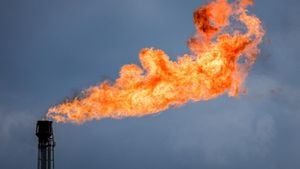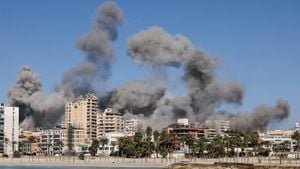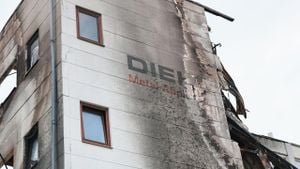Pro-Palestine protests erupted recently outside of Vice President Kamala Harris’ campaign rally, leading to significant clashes with law enforcement.
The confrontation took place on the evening of August 14, 2024, after the rally held at the iconic Apollo Theater in Harlem, New York City.
The protests were fueled by rising tensions surrounding the Biden administration’s continued support for Israel amid its conflict with Hamas.
Demonstrators, shouting slogans against the Israeli military actions, accused Harris of supporting policies they deemed oppressive.
Video footage from the scene showed crowds of protesters congregated outside the event, with some reportedly igniting smoke bombs during the altercation with police.
Notably, as tensions flared, scuffles broke out between the protesters and law enforcement, leading to several chaotic moments.
One protester was heard yelling, "You set Palestine on fire," highlighting the emotional intensity surrounding the issue.
Another protester shouted, "How dare you," reflecting the deep-seated frustrations among those opposing U.S. foreign policies perceived as siding with Israel.
Harris had just finished her speech, where she addressed various domestic policy issues, including inflation, before the protesters interrupted with chants against her.
The deputy mayor and other officials were present at the rally, emphasizing the administration's commitment to addressing various social issues.
Previous campaign stops had also seen Harris facing vocal opposition from pro-Palestinian supporters, indicating the movement's growing visibility during the campaign.
During her speeches, Harris has consistently tried to walk the line between maintaining support for Israel and acknowledging the plight of Palestinians, but this has proven to be increasingly challenging.
After the altercation, the Vice President expressed her commitment to hearing all voices, yet the clashes left much unresolved.
Many eyes are on the Biden administration as concern grows over escalating violence and the potential for increased anti-Israel sentiments to emerge.
Earlier, another protest took place at the 9/11 memorial on Staten Island, where graffiti supporting pro-Palestinian causes appeared, adding to the rising tensions.
The backlash against the Biden administration's policies is also evident among student bodies, with protests emerging across several colleges.
Institutions such as Barnard College have found themselves caught between pro-Israel and pro-Palestinian factions, leading to heated debates on campuses.
The wider societal impacts of these protests raise questions about future political consequences during the upcoming elections.
Officials at various universities are now grappling with the reality of managing campus movements advocating for both sides of the debate.
Anna, a Barnard student involved with campus activism, noted the difficulty of fostering dialogue amid rising tensions.
She mentions, "We want to have discussions, but the atmosphere makes it challenging. Everyone's emotions are running high."
The protests are becoming not just about foreign policy, but also touch on broader issues concerning antisemitism and the way it manifests during these demonstrations.
Several Jewish organizations have expressed concern, stating there is often been blurred lines between legitimate criticism of Israel and outright antisemitism.
Some members of the Jewish community have reported feeling unsafe due to the rising tensions during recent protests.
This split sentiment adds another layer of complexity, as activists seek to express their views without perpetuating discrimination.
Kamala Harris’ attempts to address these concerns have become increasingly convoluted, illustrating the tightrope political figures must walk.
Political analysts are noting the potential for these protests to impact election strategies moving forward, as candidates navigate these contentious issues.
Public reactions continue to pour in, with social media amplifying both sides of the emotional battle.
Twitter has exploded with commentary on the protests, often with starkly opposing views on both sides of the issue.
The divide among public sentiment reflects the broader concerns surrounding the U.S. involvement overseas and its ramifications at home.
Harris’ events will likely continue to face scrutiny as anti-Israel protests gain momentum, creating challenges for the campaign.
Some onlookers argue the protests signal a shift toward more vocal activism, particularly among younger generations.
Activist groups are planning more coordinated efforts to bring attention to their message, particularly leading up to the election.
The potential for increased protests remains as various organizations rally their supporters to amplify their calls for political change.
Harris' ability to address these protests successfully could play a role in shaping the Democratic Party's platform as the election draws nearer.
The unrest reflects not just current frustrations with foreign policy, but also the domestic fallout of those policies.
How it all plays out will depend on future dialogues and the willingness of both sides to engage constructively.
Only time will tell how these protests affect not just the political scene, but also community relations across the country.



